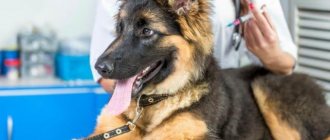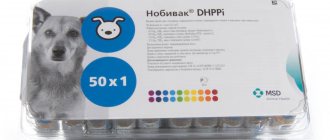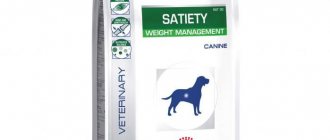Why should you vaccinate your dog?
Vaccinations are required for everyone, without exception, for pets. To protect the pet, owner and others from serious viral diseases, many of which can cause serious damage to health or even lead to death.
According to the law on veterinary medicine of the Russian Federation, all domestic animals must be immunized against rabies. Otherwise, regulatory authorities have the right to issue a protocol on an administrative violation.
An animal that has not been vaccinated against a standard set of viruses is not allowed to participate in exhibitions or released abroad. Any canine and veterinary organization has the right to refuse admission if there are no vaccination marks in the veterinary passport.
In the clinic or at home?
Where should an animal be vaccinated? Of course, it is better to get vaccinations at a veterinary clinic. To exclude negative aspects and conditions of anaphylactic shock, under the supervision of a specialist. But, if the dog does not tolerate travel well or there are other reasons, you can vaccinate your pet at home.
You need to make sure that the specialist has chosen a good vaccine and brought it in a special container. He must also have a stamp to indicate vaccination in his passport so that the owner can travel abroad with the dog, if necessary. Sometimes, the animal may not tolerate this process well, and a lump appears at the injection site. Perhaps the vaccine from this particular company is not suitable for him. In order for the lump to resolve, it is smeared with special ointments, creams and compresses are made.
Preventive vaccination of dogs is very important for the health of your dog, your health and your entire family and the health of society and all other animals. Do not neglect this procedure, reduce risks to a minimum. For example, vaccinating dogs against rabies in our country and in many others is simply a mandatory procedure. For the lack of such vaccinations, owners even face a fine according to the law. This vaccination will protect your pet for a period of twelve months to three years. Take care of your pets!
Vaccination rules
Each veterinary institution has a standard set of rules for immunizing animals.
Standard principles for vaccination:
- Preliminary deworming of the dog 10–14 days before vaccination;
- No signs of secondary diseases;
- Normal body temperature;
- Revaccinations should not be given at intervals of less than 21 days;
- Immunization is prohibited for pregnant and lactating females;
- During the change of teeth, the puppy’s immune system is very vulnerable; vaccinations are not recommended during this period of time;
- Bitches in heat can be vaccinated only if mating is not planned; when planning offspring, immunization is carried out in advance, no earlier than 2 weeks before mating.
Large dogs and pets included in the list of potentially dangerous breeds must have a muzzle. In his absence, the doctor has the right to refuse admission.
Features of care before and after vaccinations
- Before each vaccination, it is necessary to do helminth prophylaxis, approximately two weeks before the scheduled appointment . If there are signs of helminthic infestation, as well as for small puppies, before the first immunization, anthelmintic is given twice with an interval of two weeks.
- Approximately 3–4 days before visiting the veterinarian, it is necessary to especially carefully monitor the pet’s health. Measure body temperature daily. Any vaccination is given only to a completely healthy dog. Otherwise, the body's reaction to the latent virus introduced with serum may be unpredictable. A weakened animal may not develop immunity from the drug, but rather will get sick from the vaccine.
- Puppies from birth, before revaccination and another 2 weeks after it must observe strict quarantine. It is prohibited to walk in common areas or communicate with other animals, with the exception of littermates and the mother. It is not recommended to communicate with strangers without observing security measures.
Preparing and deworming your dog before vaccination
- Before each vaccination, the dog must undergo a veterinary examination by a doctor. The animal must be completely healthy.
- Seven to ten days before vaccination, deworm your dog (get rid of worms). An untreated pet can be vaccinated, but it is not advisable. Without treatment, vaccine side effects are more likely to occur. Your veterinarian will tell you how to worm your dog before vaccination and what medications to use for deworming. But you can carry out the procedure yourself by reading the article or consulting a doctor at the clinic.
- Small puppies should not be walked before the first vaccination, and if you are impatient to do this, then carry the puppy in your arms for a short time.
What vaccinations does a puppy need?
The standard vaccination complex provides protection against diseases such as:
- Carré's disease (canine plague) is a contagious viral disease that affects the nervous system. It is difficult for small puppies to tolerate and leads to death in 80% of cases;
- Rabies is dangerous for all warm-blooded animals, including humans. Cannot be treated. The infected animal must be euthanized, or death occurs on its own within 5 days;
- Parvovirus enteritis is a highly contagious viral disease, especially dangerous for young dogs under 12 months, the fragile organism dies in 95% of cases;
- Leptospirosis - jaundice, instantly affects the liver. Dangerous to humans, it spreads very quickly. In most cases it leads to the death of the animal;
- Infectious hepatitis - can lead to blindness and liver dystrophy; with fulminant hepatitis (more common in puppies), death occurs within 2 days; the virus is transmitted by contact.
Additionally, veterinary clinics offer vaccinations against:
- Piroplasmosis;
- Depriving;
- Parainfluenza;
- Adenovirus.
Also, depending on the region of residence and the number of epidemics in the area, the doctor may recommend additional immunization.
You should not ignore the veterinarian’s recommendations; he has information about the increasing incidence of diseases and will help prevent possible infection.
Vaccination table for puppies in their first year of life
| Age | Diseases | Notes |
| 8 – 12 weeks |
| First vaccination |
| 11 – 15 weeks |
| Revaccination |
| 11 – 15 weeks |
| The first immunization, if the puppy is kept in a greenhouse, can be postponed until the change of teeth |
| 9– 12 months |
| Last puppy vaccination, next in a year |
| 9 – 12 months |
| Last puppy vaccination, next one in a year |
All data entered in the table is approximate and may change based on living conditions, viruses attacking in a particular region and the puppy’s health condition.
Primary vaccination
Primary vaccination is recommended to be carried out at the dog owner's home. To avoid contact of the puppy with sick animals in the clinic. Immunization is carried out only for completely healthy pets, and upon contact with potential carriers of infections in a veterinary institution, this condition may be interrupted.
Revaccination
It is proposed to do a double vaccination, also with a veterinarian visiting your home . Until the puppy’s immunity is fully formed, contact with animals in the hospital should be avoided, because it is unknown what disease carriers come there. Moreover, having a doctor come to your place of residence will relieve the puppy of additional stress.
Vaccination table for puppies in their first year of life
The table below will help you figure out what vaccinations puppies receive:
| Dog age | What is the vaccine for? | Notes |
| 1 month | Vaccination series PUPPY | Do as needed |
| 8-10 weeks | From plague, enteritis, hepatitis, parainfluenza, leptospirosis | Primary vaccination |
| 11-13 weeks | From plague, parainfluenza, hepatitis, enteritis, leptospirosis | Revaccination |
| 11-13 weeks | For rabies | Primary vaccination |
| 6-7 months | From plague, parainfluenza, plague, enteritis, hepatitis, leptospirosis | Repeated vaccination |
| 6-7 months | For rabies | Repeated vaccination, then after a year |
| 1 year | From plague, parainfluenza, hepatitis, leptospirosis, enteritis | Repeated vaccination, then after a year |
Vaccination of an adult dog
Vaccinations for adult dogs are no different from puppy ones . The veterinarian administers the same serum, under the same conditions as for the puppy. Only the dosage of the drug and the principle of quarantine differ.
For adults, after deworming and vaccination, quarantine is not necessary. For a mature organism, revaccination is not necessary; an injection is given against all viral viruses (including rabies) once a year.
Complete vaccination schedule for dogs
Pet vaccination schedule:
- First vaccination – 8 – 12 weeks;
- Revaccination – 11 – 15 weeks;
- First rabies vaccine – 11 – 15 weeks;
- The last puppy vaccination (combined with rabies) - after a complete change of teeth 9 - 12 months;
- First adult immunization – 21 – 24 months.
The vaccination at 21–24 months is given in combination with rabies serum and is repeated annually until the end of the dog’s life.
What to do if vaccination is missed
Violation of the recommended schedule leads to a decrease in the effectiveness of the vaccine. Actions in case of absence depend on the amount of time missed.
“
If more than 1.5 years have passed since the last vaccination, then a double injection is required, as for the first time. In other cases, the vaccine is administered as soon as possible, adjusting the original schedule.
Neglecting routine vaccinations for your puppy and adult dog puts not only other animals, but also people at risk.
Despite many controversies surrounding the advisability of vaccination, 90% of vaccinated dogs avoid cases of infection. The remaining 10% experience a mild course, but still avoid death. The article is for informational purposes only.
Contact your veterinarian! Do you like the article? 0
Cost of the procedure
Vaccination prices vary depending on:
- Manufacturer of the drug.
- Spectrum of diseases covered.
- The level of service of the clinic.
- Where is the serum applied (going to the client’s home is more expensive than on site).
- Region of residence.
- Degree of competition among clinics.
- Veterinarian qualifications.
The average price for comprehensive vaccination ranges from 500 to 1000 rubles at a veterinary institution. With a home visit, depending on the client’s location, from 1000 to 2000 rubles .
Where is the best place to vaccinate?
Dog breeders try to vaccinate at home. This allows you to create a comfortable environment for the dog, which has a positive effect on the effectiveness of the vaccination. On the other hand, there is a risk of developing a complex condition that requires emergency veterinary care.
It is recommended to take your pet to a specialized clinic so that it can be examined by a veterinarian, vaccinated, and then wait there for a while. When it becomes clear that everything is fine with the pet, there is no response from the body, then you can go home.
Timely vaccination of dogs is the only way to ensure your pet has a healthy and long life full of joy.
Types of vaccines
The most popular vaccines used in Russia are divided into 4 types:
- Inactivated serums.
- Attenuated vaccines.
- Anatoxins.
- Chemicals.
The differences between the above vaccinations are based on the composition of virus strains and the principle of immunity formation in the body.
Also, modern sera are divided into single vaccines and complex ones; they differ in the possibility of developing immunity from one disease or several, respectively.
Complex serums are very popular; they are more convenient to use (there is no need to make several injections) and cheaper.
The most common drugs used at the moment:
- Nobivak. There are several types, both mono and complex. Manufactured in the Netherlands. This drug is safe even for puppy dogs, but is used only when absolutely necessary, after consultation with a veterinarian. The overall market rating is 4 out of 5, the price of the drug varies depending on the complex of diseases from 100 to 800 rubles .
- Multikan. The complex preparation of domestic production is divided into 3 types depending on the number of diseases included. It is highly efficient and has good consumer reviews. The price of the drug is in the range of 200 – 600 rubles .
- Vanguard. Also a complex vaccine made in the USA. Very effective, but protection against rabies is not included in the composition; it must be installed separately. The average cost of the drug is 300 - 500 rubles .
- Biocan. It has a wide range of protection, but reviews from owners are not all good; enteritis occurs in vaccinated dogs. Manufacturer: Czech Republic, prices in veterinary pharmacies range from 300 to 600 rubles.
Despite the different types of drugs, they are administered according to the same scheme. The serum is injected subcutaneously into the withers or intramuscularly.
What is a vaccine, how does it work and why is it needed?
Often, owners vaccinate their pets without thinking about what the vaccine consists of and how it works. Although understanding the whole process is not only interesting, but also necessary for preparing your pet for vaccination and further caring for it.
A vaccine is a biological product designed to create and maintain active immunity against certain infectious diseases.
In other words, this drug contains either live, weakened pathogens or killed ones. Based on this, vaccines are divided into groups.
Live vaccines
They consist of living but weakened strains of pathogens. Such biological products are not capable of causing disease, but are capable of inducing an immune response in the body.
Advantages of live vaccines:
- creation of long-lasting and intense immunity (more than 1 year, sometimes a lifetime);
- in most cases, single administration, small dose;
- immunity is developed in a short time;
- the production technology is cheaper than that of inactivated ones.
Disadvantages of live vaccines:
- post-vaccination complications in pregnant bitches and weakened dogs;
- reversion (return of the strain to its original virulent form);
- features in transportation and storage;
- duration of receiving the attenuated (weakened) vaccine.
Inactivated vaccines
Biological products based on a completely killed strain of the virus.
Advantages of inactivated vaccine:
- does not cause complications after vaccination;
- immunity is less tense;
- ease of production and relatively low cost.
Disadvantages of inactivated vaccine:
- low immunogenicity;
- need for 3-4 times application, large volume;
- immunity, compared to a live vaccine, does not last long;
- increased likelihood of allergic reactions.
Difference in vaccines by number of strains
- Monovalent - against one strain of pathogen.
- Polyvalent - against several strains of one pathogen.
- Associated (combined) – against several pathogens.
Most often, associated live vaccines are used in practice.
Complications after vaccinations
Over the next two days after immunization, the dog’s body develops immunity to viruses.
- At this moment, the pet may be a little depressed and refuse food. There is no need to be afraid of this, everything should go away within the next 48 to 72 hours . Otherwise, you will have to contact the clinic again.
- Allergic reactions to vaccinations are possible in theory, but in practice such cases are extremely rare. Despite this, many modern veterinary institutions value their reputation and give an injection of an antihistamine before administering antiviral serum.
If your pet begins to experience allergic reactions after the vaccine (swelling, itching, redness and discharge from the mucous membranes), you need to seek help from the doctor who administered the injection. And at the next immunization, use a different serum.
Thanks to an increase in the level of canine literacy of the population and a breakthrough in veterinary medicine. Over the past two decades, it has been possible to reduce the mortality rate of animals under 3 months of age by almost 3 times. It was possible to reduce rabies epidemics in populated areas by 5 times. This is how many lives are saved thanks to a simple injection in the withers.
3.7 / 5 ( 3 voices)
How does dog immunity work?
Whether to vaccinate your animal - today in Russia this question is decided only by the pet owner. There are cases where a dog without vaccination has pleased its owners with good health for many years, and sometimes a five-month-old puppy suddenly dies from an unknown infection. Dogs, like other warm-blooded animals, have two types of immunity: inherited (this is due to genetic characteristics) and acquired.
Inherited immunity is considered more durable because it develops in the natural environment and is passed on from generation to generation.
Acquired protection can develop in a pet in two ways: due to a previous infection or as a result of vaccination. This protection gives puppies active resistance to disease for a period of fifteen days to several years. For this reason, if you visit the veterinarian in advance, there will be no danger to her health from all kinds of diseases and infections.
Exceptions and contraindications
Dogs are vaccinated according to the vaccination calendar, but in some cases the procedure has to be postponed for a certain period. There are also some contraindications to vaccination of some animals. Let's take a closer look at this issue.
When not to vaccinate your dog:
- The animal is sick.
- Low immunity.
- Vaccinations are not given to puppies under 2 months of age.
- During the period of change of milk teeth.
- Before mating (90 days quarantine after vaccination).
- The dog was found to have an individual intolerance to the components included in the vaccine, which manifests itself as an allergic reaction.
Puppies growing up without a mother can receive their first vaccination at 6-8 weeks. This is due to a lack of natural immune protection, which the baby could not receive from mother's milk.
The timing of vaccination may change due to the epidemiological situation in the area. For example, if outbreaks of certain infections are recorded, the dog may be vaccinated ahead of schedule.










